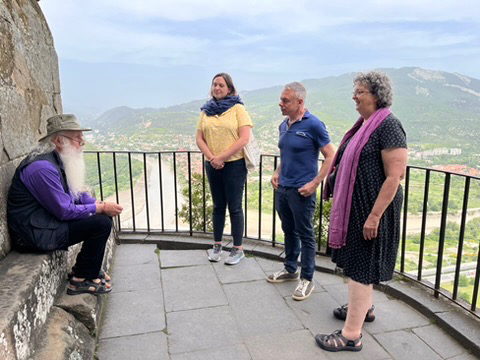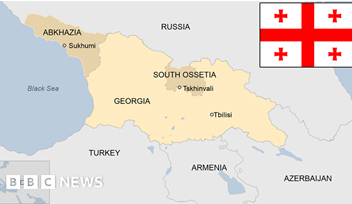A letter from Ellen Smith, mission co-worker serving in Eastern and Central Europe
Fall 2024
Individuals: Give online to E132192 in honor of Ellen Smith’s ministry
Congregations: Give to D500115 in honor of Ellen Smith’s ministry
Churches are asked to send donations through your congregation’s normal receiving site (this is usually your presbytery)
Dear friends,
As I wander across the broad region of Eastern Europe, I am acutely aware of the legacy of the Cold War for the countries that were within and around the borders of the Soviet Union. This summer, Al and I had the privilege of teaching a course at the Synod of Lakes and Prairies Synod School. The title of our course was “Central and Eastern Europe: The Legacy of Soviet Times.” We began by looking at the history of borders in Europe with a moving map from 400 BC to the present, taking screen shots at specific dates so that we could look more closely.
Western Europe has had a more stable history in terms of borders than Eastern Europe. The reality of Eastern Europe is that the borders have shifted continually over the last 1000+ years, leaving peoples with their own languages and cultures under new kings and princes in ever shifting empires. World War I and World War II redrew many boundaries. In those shifting borders there has been historical trauma that is deeply engrained in the historic memory these lands (the land and not the present-day nations). People have been caught in new countries that they have felt no allegiance to the regimes of the new countries when the borders shifted. One result of this is the many languages spoken in Ukraine alone. Ethnic identities are strong in Eastern Europe.
Within the Soviet Union, autonomous republics shifted at the will of whoever was in charge, whether that was Stalin or Khrushchev or any of the others. The Cold War period was felt globally, but the experience of living under the Soviet Union changed nations, whether they had been annexed into the Soviet Union or were behind the iron curtain. The Soviet regime’s domination of the region has left deep scars from the trauma on all people under its occupation, including the people of Russia.This was something that I did not think all that much about in the early 2000s, when our family moved to Moscow. There was cooperation between the churches in Russia and those in Belarus, Ukraine, and Georgia. There were many missionaries serving churches in Russia from Ukraine and Moldova. They had lived through the Soviet Union together and were still helping one another. There was hope, but not confidence. I remember a pastor close to our family telling me, “We do not know how long this freedom will last, so we are working as hard as we can to reach people.” These past 10 years in particular have confirmed his lack of confidence.
Through those early years, we watched as things began to change. In 2008, we were living across a park from the Russian version of the Pentagon. On August 8, we were preparing to take a group out to the Smolensk region to visit a new partner. We woke up to streets closed off to traffic, as Russia invaded the Republic of Georgia. We barely got out of our apartment complex and managed to get out of the city. The Russian narrative was that Georgia had invaded Russia and Russia was defending herself. That is always the Russian narrative.
____
At the end of May 2024, PC(USA) Area Coordinator for the Middle East and Europe Luciano Kovacs and I arrived in the Tbilisi, the capital of Georgia to visit the Peace Cathedral of the Evangelical Baptist Church of Georgia. We had been trying to get there since before COVID. I invited my daughter Meg to join us since she is a historian and always interested in ancient places.
Some believe that Georgia is one of the oldest civilizations in the world, flourishing in the 11th and 12th centuries. Like Russia and Ukraine, it suffered under the Mongol occupation in the 15th century and assaults from the Persians and the Ottomans in later years. Georgia was annexed by the Russian Empire in 1801. From 1917-1922, it was independent under a German protectorate, but then was absorbed by the Soviet Union. In 1989, Georgia began struggling for independence from the Soviet Union, finally succeeding in 1991. Under the Soviet Union, a number of autonomous regions were tied to Georgia, including Abkhazia and South Ossetia. In 1992, secessionists in Abkhazia, an autonomous, largely Muslim republic within Georgia, staged an armed revolt against the Georgian central government and defeated the Georgian troops. Russian interference of the side of the Abkhazian rebels may have played a significant role in Georgia’s defeat. The war with Abkhazia lingered for most of a decade. In 2008, Russia lured Georgia into another war over the autonomous region of South Ossetia. Twenty per cent of Georgia is now occupied by Russia. Currently, the Georgian Dream party (which is pro-Russian) dominates the government and, in spite of widespread protests, is implementing Russian style laws. The people of Georgia have long wanted European Union (EU) membership and attained EU candidate status in November 2023. Their own (pro-Russian) government is, however, sabotaging that candidacy.
Though they, and we, had wanted us to come sooner, by the end of our trip, we all agreed that we had come at just the right time. You may have seen the news about demonstrations in Georgia, young people out in the streets trying to speak to power, as the government passed a law (like one in Russia), labeling NGOs that receive more than 20% of their funding from foreign sources as foreign agents. The protesters were met with tear gas and violence. The opposition was strong, but the government did not listen. The president, Salome Zourabichvili, vetoed the law as fundamentally Russian and an obstacle to EU membership, but the Prime Minister’s Georgian Dream party had enough votes to override the veto. The Georgian Dream party has also proposed a new law that would curb LGBT rights. There have been demonstrations against that proposal as well, and there have been violent attacks against LGBT activists. These are difficult days in Georgia, as they look ahead to parliamentary elections in October, hoping they will be free and fair.
The Peace Cathedral and the Evangelical Baptist Church of Georgia are in a vulnerable space. As their name suggests, they are peace activists, engaged in ecumenical and interfaith dialogue and cooperation. In a time of social division, they seek to come together with the other welcoming them in community. They have built a synagogue and a mosque alongside their cathedral, so that the space may be a gathering place for all. They also have a Buddhist shrine. They stand with the Yazidi community. They stand with the LGBTQIA community. They stand with the refugees. When the war broke out in Abkhazia, they built a refugee center called Beteli to receive those fleeing the war. During the war in Chechnya, they welcomed their traditional enemies (Chechens and Georgians have a long and fraught history). Now Beteli has welcomed Ukrainians. Some of the Ukrainian refugees started a ceramic workshop within Beteli to provide art therapy. That project continues to grow, healing the wounds of adults and children. They stand with the vulnerable and become vulnerable as well, but they remain steadfast.
In 2023, the European Baptist Federation (EBF) Council met in Moscow, Russia. During their meetings, they withdrew the membership of the Evangelical Baptist Church of Georgia. The formal reason for this action was because of division within the Baptist community in Georgia. (One bishop left the Peace Cathedral, because of women’s ordination and support of the LGBTQIA community.) The Peace Cathedral sees the real reason for the EBF’s action as twofold – their take on being an inclusive community and their deep commitment towards interfaith dialogue. Other countries also have divided Baptist communities, but the Baptist communities of those countries have not had their membership withdrawn.
Our visit to Georgia has blessed us and we look forward to how our partnership with the Evangelical Baptist Church of Georgia develops.
Ellen
![]() You may freely reuse and distribute this article in its entirety for non-commercial purposes in any medium. Please include author attribution, photography credits, and a link to the original article. This work is licensed under a Creative Commons Attribution-NonCommercial-NoDeratives 4.0 International License.
You may freely reuse and distribute this article in its entirety for non-commercial purposes in any medium. Please include author attribution, photography credits, and a link to the original article. This work is licensed under a Creative Commons Attribution-NonCommercial-NoDeratives 4.0 International License.







